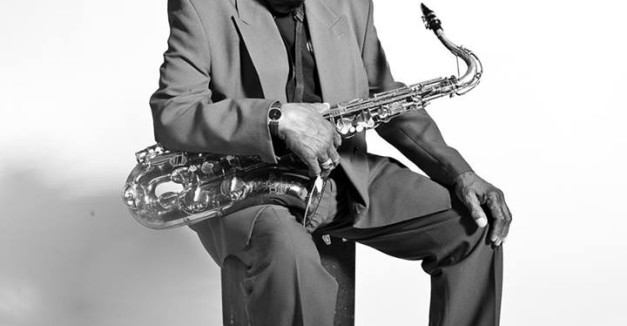In 1957, Shaw sat in with the Muddy Waters band in Itta Bena, Mississippi. Waters hired him on the spot and Eddie arrived in Chicago as a member of the top band in town. The Chicago bands of Waters and Howlin’ Wolf were built around amplified country blues, and Shaw found that he had to play differently in Chicago from the way he had in Mississippi. He was usually the only horn player in the band and no longer had section arrangements or short, set parts to play, but he adapted to the new demands as a soloist. He spent a few months with Waters, a few months with Wolf, went back to Greenville for a short stay, and then settled in Chicago for good. He rejoined Wolf for about two years, moved on to the Otis Rush band, and during the ‘60s worked most often with Magic Sam on the West Side. In between, there were plenty of weekend gigs with any band that needed a sax man for a night or two – “in and out of bands, up and down the highway,” said Shaw.
Shaw sang and fronted his own band from time to time, using guitar players such as Luther “Guitar Jr.” Johnson, Magic Sam, and Jesse Robinson. He played on recording sessions with Jimmy Dawkins. Freddie King, Magic Sam, Howlin’ Wolf, and others, and occasionally took his band into the studio to record dubs for promotional use on jukeboxes and on Big Bill Hill’s local radio and TV programs. One such recording, an instrumental called “Blues For The West Side,” became a minor Chicago hit when it was issued as a single by Colt Records. In addition, he wrote songs for Willie Dixon, Andrew “Blueblood” McMahon, Magic Sam, and Howlin’ Wolf, and contributed arrangements to sessions by Waters, Wolf, and others. Shaw’s many contributions to the blues include arranging tracks for The London Howlin’ Wolf Sessions, which featured Eric Clapton, Bill Wyman, Ringo Starr and others.
In the midst of all this, Shaw was usually involved in some sort of independent business venture, such as an air conditioning and refrigeration service, a laundromat, a barbecue joint, and a tavern, which was famed for its all-star Monday jam sessions. For a number of years, he operated the biggest blues club on the West Side, Eddie’s Place (The New 1815 Club), which featured such top-notch blues acts as Luther Allison, James Cotton, Jimmy Reed, Otis Rush, Little Johnny Taylor, Howlin’ Wolf, and Mighty Joe Young.
Besides constantly touring for over two decades, Shaw has continued to record prolifically. His debut album, Have Blues, Will Travel, was released in 1977 on the Simmons label and later reissued by Rooster Blues. He cut four sides in 1978 for Alligator’s Living Chicago Blues series with the famed Hubert Sumlin on guitar. Since then, he’s cut a couple of albums for Rooster Blues, one for the French Isabel label (issued in the USA by Evidence), five for the Austrian Wolf label, and one for Chicago’s own Delmark Records.
http://eddieshawsax.com/home




